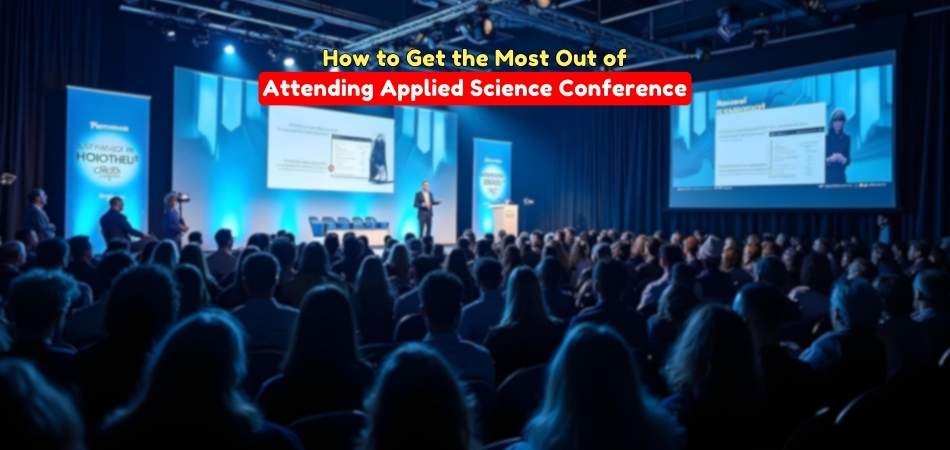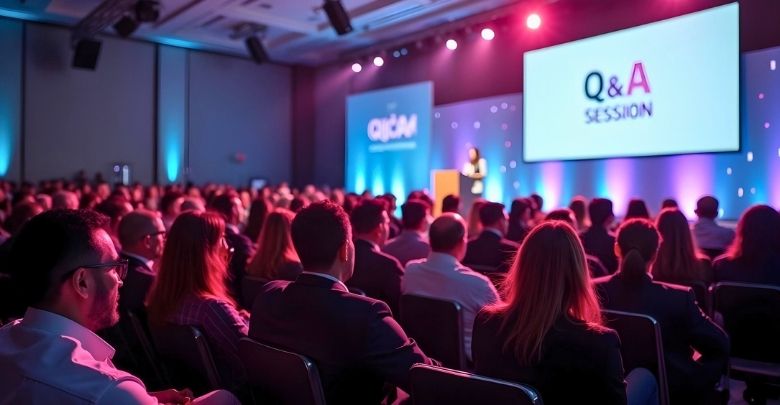Conferences on applied science offer a great opportunity to gain knowledge, network, and stay up-to-date on the latest trends and research. But, to truly make the most of these events, preparation and active participation are key. So, how to get the most out of attending an applied science conference?
To get the most out of an applied science conference, you have to plan ahead, engage actively in sessions, network strategically, explore exhibits, attend social events, take notes, and follow up with new connections to maximize learning and opportunities.
Do you want to take advantage of every moment? Read on to discover practical tips and strategies for maximizing the value of your next applied science conference.
How to Get the Most Out of Attending an Applied Science Conference?
Participating in an applied science conference can open doors to new knowledge, valuable connections, and exciting opportunities. It’s an excellent chance to learn from experts and engage with like-minded individuals. Here’s how to make the most of it:

Plan Your Conference Experience
Start by researching the event schedule and identifying sessions that align with your interests. Define clear goals for attending, such as networking or gaining knowledge. Arrive early to avoid missing key opportunities like workshops and speaker sessions. Prioritize your time wisely to ensure you make the most of the event.
Engage Actively in Sessions
Take part in discussions by asking thoughtful questions to improve knowledge and visibility. Share your opinions or insights during group interactions to build rapport. Stay attentive to presentations and take notes on key points for later review. Show genuine curiosity and appreciation for the speakers’ expertise.
Network with Purpose
Introduce yourself to fellow attendees with a friendly, confident approach to start conversations. Exchange business cards or social media handles to stay connected post-event. Prepare an elevator pitch about your work to make introductions seamless. Whether you are attending the applied sciences conference in Canada, or other countries, networking is essential. It doesn’t matter where you are attending the conference from.
Explore Exhibition Opportunities
Visit exhibitor booths to learn about innovative technologies and research developments in your field. Ask detailed questions to deepen your learning of the products or services displayed. Stay curious and open-minded when engaging with exhibitors to discover new possibilities. Use this time to make connections with leading companies or researchers.
Take Meaningful Notes
Jot down key ideas, quotes, or concepts during each session for reference later. Use a digital app to organize your notes efficiently. Summarize the main takeaways from each day to solidify your learning. Well-organized notes will be valuable resources for future projects or collaborations.
Participate in Social Events
Attend social activities like dinners, mixers, or meetups to form connections in a relaxed setting. Be approachable, enthusiastic, and ready to engage in meaningful conversations. Share insights or thoughts with others to create lasting impressions. Social events are a unique chance to meet like-minded professionals informally.
Follow Up After the Event
Send polite emails or messages to contacts made during the conference to strengthen relationships. Share relevant information or articles to add value to your follow-up. Join online groups or forums related to the event for continued engagement. Stay connected to maintain professional relationships and promote collaborations.
Local or International Applied Science Conferences- Which One is Better for Participating?
Conferences in applied science, whether local or international, offer unique opportunities for professional development and networking. Based on your goals, budget, and interests, you can choose between the two. Below is a comparison table highlighting key differences to help you decide which is better for you:
| Aspect | Local Applied Science Conferences | International Applied Science Conferences |
| Cost | Lower travel and accommodation expenses. | Higher costs due to international travel and lodging. |
| Networking | Connect with local professionals and industry peers. | Build a global network with diverse professionals. |
| Accessibility | Easier to attend with minimal travel planning. | Requires visas and complex travel arrangements. |
| Exposure to Ideas | Focus on regional research and innovations. | Access to global research trends and creative ideas. |
| Opportunities | More relevant to local job markets and industries. | Broader career and collaboration opportunities worldwide. |
| Cultural Experience | Familiar cultural environment and professional norms. | Exposure to new cultures, practices, and perspectives. |
| Time Commitment | Shorter duration, ideal for quick learning. | Longer events, offering in-depth learning experiences. |
| Language Barrier | Communication is easier in your native language. | May require adapting to multiple languages or accents. |
| Resource Access | Access to local sponsors, partners, and vendors. | Interaction with international companies and technologies. |
| Content Diversity | Limited to regional topics and speakers. | Features global experts and diverse research fields. |
How Can You Engage in an Applied Science Conference Q&A Session Without Feeling Nervous?
Participating in a Q&A session at an applied science conference can be challenging for many attendees. However, engaging effectively can deepen your knowledge and help you connect with experts. Here are some tips for feeling confident and participating without feeling nervous:
Prepare Thoughtful Questions
Start by reviewing the session topics and speaker profiles before attending. This preparation allows you to craft relevant and insightful questions. Write down your questions to organize your thoughts and avoid forgetting them. Being prepared will make you feel more confident and engaged during the session.
Listen Actively to the Speaker
Pay close attention to the speaker’s key points and examples. Taking brief notes helps you remember details and form meaningful questions. Active listening ensures your questions are thoughtful and relevant. This also shows respect for the speaker and the discussion.
Practice Deep Breathing Techniques
Feeling nervous is natural, but deep breathing can help you stay calm. Inhale slowly through your nose and exhale gently to reduce anxiety. Practicing this technique before and during the session keeps your mind clear. A calm mind will make speaking up much easier.
Start with Simple, Open-Ended Questions
If you’re nervous, begin with simple, open-ended questions to ease into the conversation. Questions like “Can you explain this further?” encourage detailed responses without putting pressure on you. Avoid overly complex or challenging questions at first. This approach makes the exchange more comfortable for everyone.
Make Eye Contact and Speak Clearly
When speaking, make eye contact with the speaker or moderator to show confidence. Speak slowly and clearly to ensure your question is understood. Avoid fidgeting or mumbling, as it can make you appear more nervous. A clear, steady tone reflects confidence and invites engagement.
Remind Yourself That Participation Is Valuable
Your curiosity and questions contribute to the session’s overall value. Many attendees might have similar questions, but are too shy to ask. By participating, you’re helping create a richer learning environment. Remember, speakers appreciate engaged and thoughtful participants.
Are Applied Science Conferences Beneficial to Anyone?
Yes, applied science conferences are beneficial to anyone looking to expand their knowledge and network. These events provide access to valuable insights from experts and offer collaboration opportunities. No matter what stage of your career you’re at, attending can help you.
The ideal attendee for applied science conference is someone passionate about learning and growing in their field. These conferences allow participants to engage with the latest research and innovative ideas. Networking opportunities further improve the experience, helping to build valuable connections.
Those attending will be able to leave with a fresh outlook on their work, as well as new ideas. These events also encourage interaction with like-minded individuals and organizations. In addition to learning about their careers and personal development, participants can gain valuable knowledge at the event.
Best Ways to Budget for an Applied Science Conference
Applied science conferences provide excellent opportunities for learning and networking, but they are often costly. Proper budgeting ensures you make the most of the event without overspending. Here are the best ways to budget effectively for an applied science conference:
- Set a Clear Budget Early: Determine how much you can realistically spend on the conference. This prevents overspending and helps prioritize essential expenses.
- Register Early for Discounts: Early registration often comes with lower fees. Signing up in advance can significantly reduce your overall costs.
- Look for Travel Deals: Book flights and transportation early to secure cheaper rates. Using comparison websites can help you find the best deals.
- Share Accommodation Costs: Consider sharing a hotel room with a colleague. This can cut your lodging expenses in half and save money.
- Apply for Grants or Scholarships: Many conferences offer financial aid for students or professionals. Research available grants and apply early for support.
- Limit Non-Essential Spending: Avoid spending on unnecessary items like luxury meals or souvenirs. Focus on essential expenses to stay within budget.
- Use Public Transportation: Opt for buses or trains instead of taxis or rental cars. Public transport is usually more affordable and convenient.
- Plan Meals in Advance: Choose budget-friendly restaurants or pack your meals. This can help you avoid costly dining expenses during the event.
How to Deal With Common Issues at an Applied Science Conference?
There are a lot of advantages to attending an applied science conference, but there are also challenges to be faced. From technical issues to networking difficulties, staying prepared is key. Here are helpful strategies to handle common issues smoothly and make the most of your experience:
Prepare for Technical Difficulties
Always carry backup copies of your presentation on a USB drive and cloud storage. Arrive early to test the equipment before your session. Familiarize yourself with the conference’s tech support contacts. Quick action can prevent small technical issues from becoming major disruptions.
Manage Time Effectively
Plan your day by reviewing the conference schedule in advance. Prioritize sessions that align with your professional goals. Set reminders for key events to avoid missing them. Good time management ensures you attend important sessions and networking opportunities.
Submit Work and Meet Deadlines
If you’re planning to submit a research paper for an applied science conference, make sure to meet all submission deadlines and guidelines. Double-check your paper for accuracy and clarity before submission. If issues arise during submission, contact the organizers for clarification or assistance. Clear communication will ensure your work is considered for presentation.
Handle Last-Minute Changes Calmly
Stay updated on any schedule or venue changes through the conference app or announcements. Have a flexible mindset to adapt quickly. If a session is canceled, use that time to network. Being adaptable allows you to stay productive despite changes.
Manage Networking Challenges
If you feel shy, start by joining small group discussions. Prepare a short introduction about your work to share easily. Use conference social media hashtags to connect with other attendees online. Building connections gradually can make networking more comfortable.
Manage Stress and Fatigue
Take short breaks between sessions to relax and recharge. Stay hydrated and eat balanced meals throughout the day. Practice deep breathing to reduce anxiety during busy moments. Prioritizing self-care helps you stay focused and engaged throughout the event.
Answers to Some Common Questions
Many attendees have questions about how to maximize their experiences at an applied science conference, which can be invaluable for their professional development. Below, you’ll find answers to some common inquiries that can help you understand and make the most of these events.
How Do I Balance Attending Multiple Sessions at an Applied Science Conference?
Balance sessions by reviewing the schedule in advance and selecting those that align with your goals. Prioritize sessions and leave room for networking or other valuable activities. Be flexible if you feel the need to take breaks or adjust your schedule. Don’t over-schedule; focus on quality participation rather than quantity.
What Should I Do if I Miss an Important Session at the Conference?
If you miss a session, try to connect with attendees who were present to get a summary. You can also ask the speaker directly for a recap of the main points. Many conferences offer session recordings or slides, so inquire about these resources. Besides, engaging in online groups or social media can offer insights from others.
How Do I Decide Which Applied Science Conference to Attend?
Consider your professional goals and which conference offers the most relevant content for your field. Research the speakers, topics, and networking opportunities available at each event. Assess the location and costs involved, factoring in convenience and feasibility. Eventually, determine if the conference will offer long-term value for your career.
Should I Attend the Entire Duration of the Applied Science Conference?
Attending the full duration allows you to experience all the networking, sessions, and social events. However, if your time is limited, prioritize the most relevant sessions to your work. Attend key presentations and workshops that align with your professional goals. It’s important to balance your participation to avoid feeling overwhelmed.
How Can I Avoid Distractions During a Conference Session?
Minimize distractions by turning off your phone or placing it in airplane mode. Focus on the session and take organized notes to stay engaged. If distractions arise, refocus by reminding yourself of your goals for the session. Avoid multitasking to ensure you absorb the full value of the session.
Final Thoughts
A conference on applied science can be immensely beneficial if it is approached with preparation and active engagement. To truly benefit, focus on planning ahead, engaging in meaningful sessions, and networking with purpose. Knowing how to get the most out of attending an applied science conference means taking advantage of exhibits, social events, and follow-ups.
Remember, staying organized, asking thoughtful questions, and balancing your time wisely can enhance your experience. Whether you’re looking to learn, collaborate, or expand your professional network, a well-prepared approach will ensure you make the most of this opportunity for growth and development.







